The UK is among one of the most economically damaged nations from COVID-19 coronavirus and it will significantly impact on the country’s security in 2020 and beyond, as it deals with increasing cyber threats, challenges from adverse states like Russia and Iran, as well as protecting its interests in the Middle-East and Africa.
This article was submitted to the UK Defence Journal by Harry Basnett, a graduate of International Politics and Strategic Studies BA (Hons) from Aberystwyth University. As with any opinion piece, the views expressed here are not necessarily the opinion of the UK Defence Journal. Our aim is to promote discussion in defence and we do this by presenting views from as a wide range of people as possible.
At the time of writing 261,184 Britons have been infected by coronavirus and 36,914 have succumbed to its symptoms.
In response to the spread of the disease the UK government announced a lockdown, in all but name, on the 23rd of March – closing non-essential businesses, schools and public areas, making unnecessary journeys a criminal offence and imposing social-distancing rules. This was extended on April 16th by a further three weeks, but will likely last longer on certain aspects of society.
These measures are projected to have serious impacts for the UK’s economy. The OBR has forecast public sector borrowing to increase by £218 Billion in 2020, a surge of 79% on previously expected figures. In addition to a 35% drop in GDP in the second quarter of this year, and 12.8% overall, followed by a climb of 17.9% in 2021 (as viewable in Figure 1).
This is the largest ever collapse in British GDP from the previous year – around 15%. The previous occurred during the Spanish Flu, which saw a fall of 12% (as shown in Figure 2).
There is no doubt that the outlook for the UK economy in 2020 /21 is bleak. And raises the questions, how will the government respond? And how will this impact on defence expenditure?
It is likely that the government will respond by restricting the spending of government departments, including the MOD, as was done following the 2007/8 financial crash, where defence expenditure shrunk from 2.5% of GDP in 2009, to 2.1% in 2015.7
GlobalData Intelligence have produced two projections for how MOD’s budget could be impacted in response to COVID-19’s effect on the economy. One, showing a scenario in which the status-quo was maintained (where-by no gross or actual increase in expenditure is observed) and another showing the effect of austerity on the budget. The first would see the budget initially slow-down in 2020, but grow afterwards – to $53.8 Billion in 2024. The second projects a continued decline in expenditure from 2020 until 2024, where it will represent 1.7% of GDP, at $49 Billion. These scenarios both predict a shortfall on the pre-COVID-19 projections, which told of a steady increase in defence expenditure from $51.2 Billion in 2020 to $59.4 Billion in 2024, a relative increase of 16% (these three models are shown in Figure 3).
By both of these scenarios, the effect of COVID-19 on the UK’s economy will significantly impact on the defence budget. It will either temporarily reduce relative expenditure and later the growth which could have been expected or force a much more significant decline, noted to be as much as $10.4 Billion – a 17%, shortfall on the pre-coronavirus expectation.
Such eventualities raised the question: how will a reduce defence budget, caused by COVID19, impact on British security and defence in 2020 and the following years?
To begin, it’s likely to increase difficulties for the UK in areas of cyber-intelligence – an already heavily underfunded, concentrated and prioritised aspect of security, which has been battling for a position of importance against conventional tools of warfare (Army, Navy, and Air Force) in recent years.
The global cyber situation is becoming increasingly hostile, with states and non-state actors seeking to infiltrate UK security. Russia, China, Iran and North Korea have been tipped as the largest operators in this area, along with less proficient groups and individuals. In 2019 alone the NCSC stopped 600 cyber operations against the country, had they been successful the attacks would have caused significant damage to our “social fabric … way of life and … economic prosperity”.
As time continues and the capabilities of its adversaries develop, especially during these uncertain times, the risk of an operation which would harm or destroy key infrastructure, infiltrate Britain’s democracy or undermine its social and financial harmony is ever more present.
A reduction in defence expenditure (or wider government financing in departments which deal with cyber security) will only make preventing these operations and their effects more difficult. With lower expenditure being distributed and re-prioritised, perhaps to more conventional areas of security, cyber defence risks being side-lined and underfunded. Such a scenario would only serve to decrease the ability of the NCSC and other organisations to counter these operations, while too increasing the possibility that one of them could seriously impact on the nation’s defence.
A lower defence budget is also likely to raise questions over the necessity and capability of the UK to possess certain military provisions. In particular, whether it can afford to maintain/renew the trident nuclear deterrent, in addition to both, or any, of the Queen Elizabeth class aircraft carriers.

Questions were already being raised about the affordability and necessity for both projects based on the pre-coronavirus budgets, but these opinions will only become more legitimate as the UK see’s its defence expenditure shrink. In which case how would Britain be able afford to maintain these provisions?
It would surely be forced to decommission one, if not both carriers? Or even delay the renewal of Trident?
Either of these scenarios would expose the UK to yet further risk from adverse states such as Russia, who has aimed in recent years to impinge on its sovereignty, by flying threateningly close to its AIRspace and passing close by its waters. Indeed, when discussing Moscow’s challenge to the UK, it only becomes more heightened during times of crisis, like those we are currently experiencing, and will experience with the predicted economic crisis to follow. This has been shown recently through the shadowing of seven Russian warships by the Royal Navy in waters near the British Isles, during the height of the COVID-19 pandemic.
Decommissioning the carriers would also remove the UK’s ability to launch aerial operations from anywhere in the globe. It would instead have to rely on domestic and overseas RAF bases (which could too be victim to shrinking expenditure) or use those of its allies. It has been forced to so in recent operations in Syria and Iraq, during Operation Shader – placing strain on the effectiveness of Britain to undertake its operations.
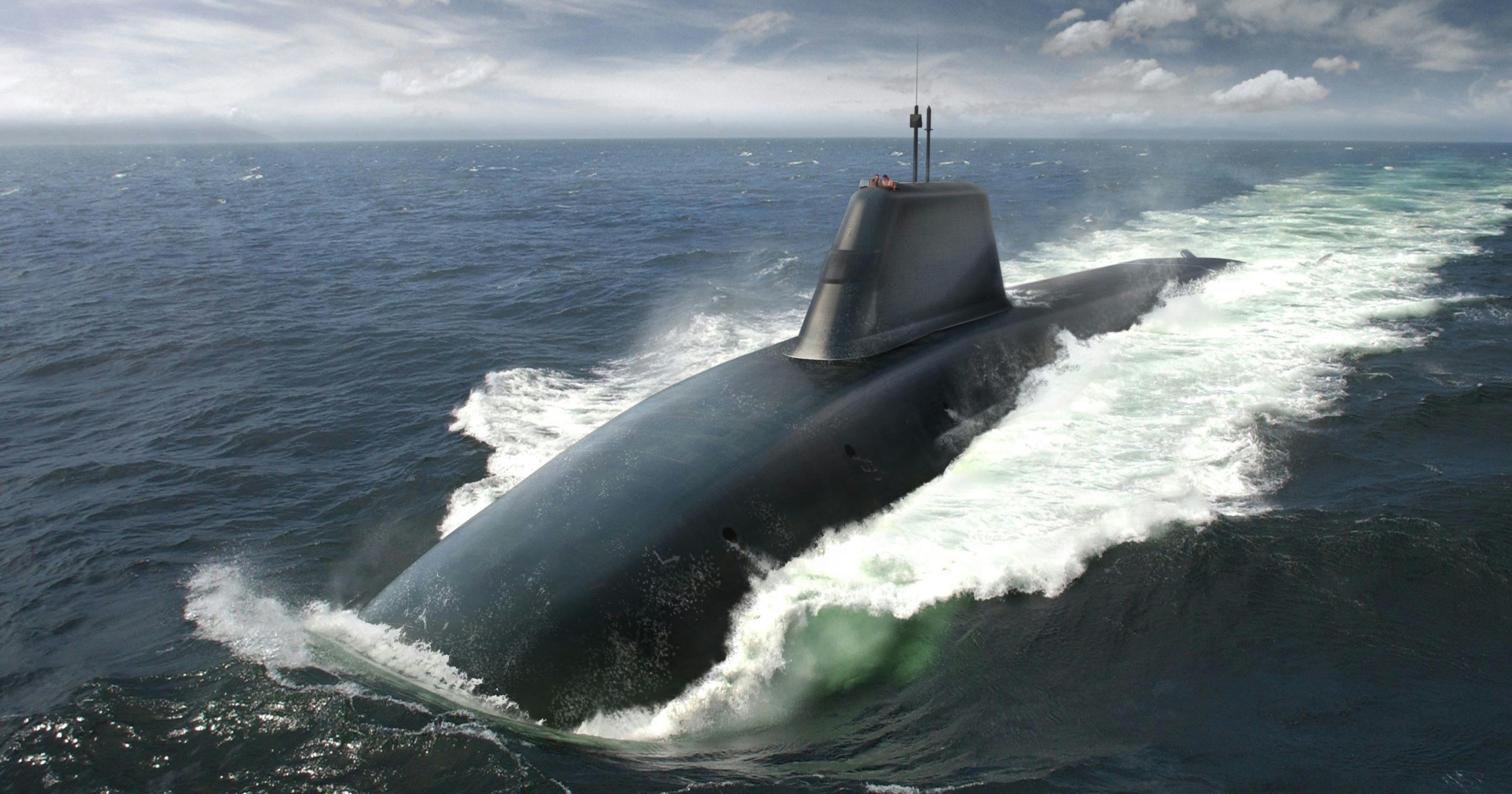
Therefore, by removing this capability, Britain would see significant effects in its operational ability and the availability to readily defend itself from adversaries.
Finally, the reduced budget would call into question the participation of the UK in military and training operations across Europe, the Middle-East and Africa. Britain is currently involved in many deployments, by command of the Government, or through NATO and the UN; in particular, the armed forces are undertaking operations in the Baltic States and Ukraine to counter Russian aggression, in Syria, Iraq and Afghanistan to deter terrorist organisations and in South Sudan to maintain peace and stability in the region.
However, with a reduced budget would come a necessary reassessment of operations, in which some overseas deployments could be called into question. Notes be may be taken on the need of the UK to still have an active presence in Iraq and Syria, when ISIS and other terrorist groups have subsided? Or, whether the UK can afford to operate in UN missions in South Sudan and other unstable nations?
By withdrawing from these military deployments, not only will the UK signal its reduced position on the global stage, but it could see the emergence/resurgence of threats which are contrary to its interests. This might include a rebirth of terrorist groups and their ideologies and/or intensified posturing from aggressive states, while peace and stability in some regions could be lost. These are threats which could have significant impacts on British security in the short term and later, when the effects of these scenarios becomes apparent.
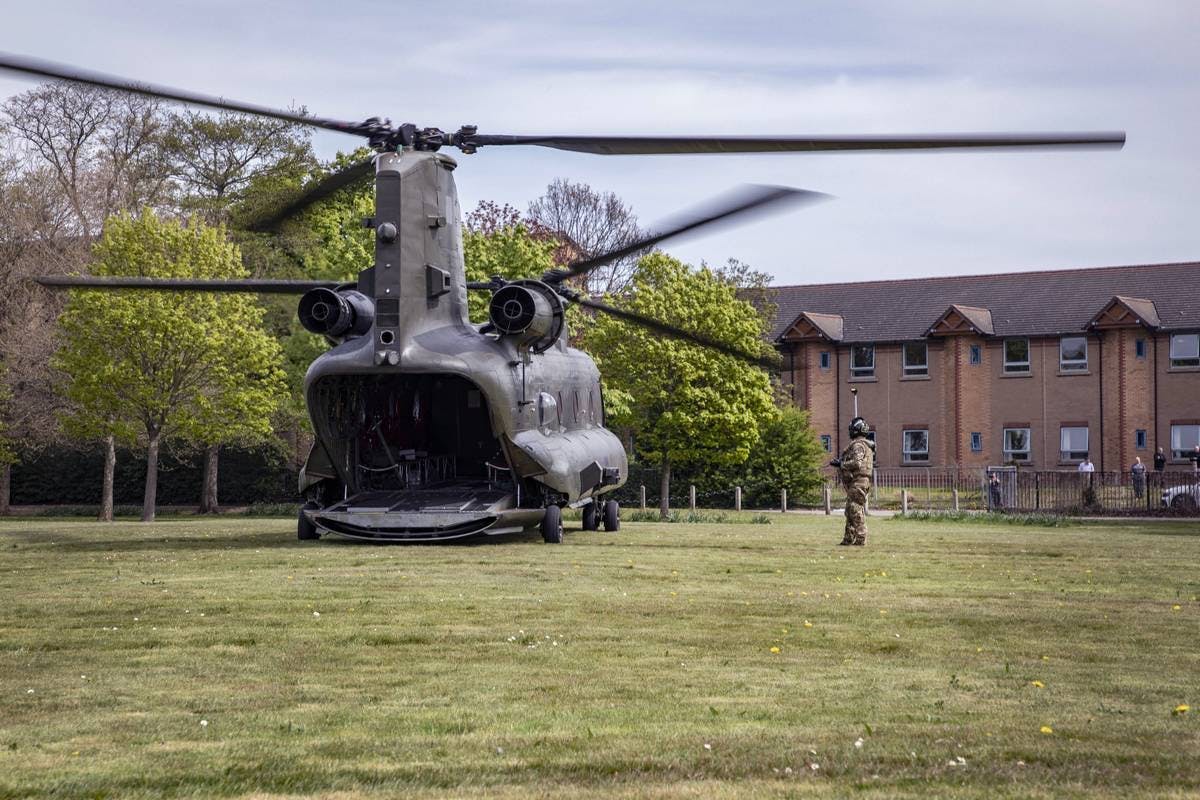
Thus, COVID-19’s economic impact on the UK’s defence budget is likely to present very serious challenges for the country’s security. Britain would be forced to grapple with the increasing global hostility it finds itself in, all with much lower expenditure, in gross and actual terms. It will force a re- assessment of priorities, doing so is likely to create shortfalls in cyber security, conventional weapons and overseas operations. All of which will have an adverse effect on the UK’s ability to defend itself from threats and could lead to significant damage to the country’s economic, political and social security.
With this reality, the armed forces, MOD and wider-Government should be preparing to deal with the increasing challenges that will face the country from a reduced defence budget. In particular, it should make urgent preparations for a potential and significant cyber operation to be carried out against the nation, for the decommissioning of both aircraft carriers (or the delay of Trident’s renewal) and for how oversees missions could be scaled down; with necessary attention given to how Britain will deal with the security challenges that these scenarios present.


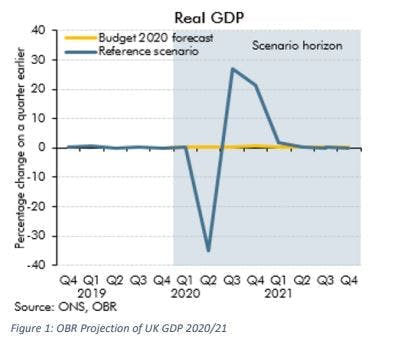
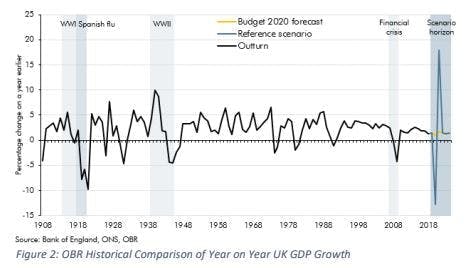
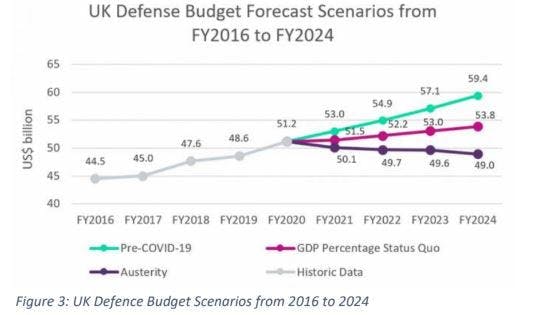











I’ve been banging on about the likely doom post-COVID 19 on the UK defence budget. Sadly, post WW2 history has proved that defence is always in the Treasuries crosshairs? I fear some stupid and illogical cuts will be made at the same time committing even more defence assets post Brexit. So, nothing new there then! I don’t look forward to future pages on this site, as the inevitable axe falls and falls again. Those two carriers should start to quiver a little, as the months and years pass, their retention will be repeatedly brought into question?
The government has already indicated that it won’t be conducting an austerity approach with regard to the Covid related debt or the related economic recession.
Austerity was arguably appropriate for the 2008 Crash which saw the U.K. disproportionately affected due to U.K’s large financial sector. Some countries did not experience a recession at all. The U.K. entered the situation running a an annual deficit and then had to take in large amounts of debt for the banking bail outs.
Subsequently the government had interest to pay in these debts; the interest was in the region of the entire annual defence budget. The government also had increased OPEX costs due to unemployment benefits, and smaller tax receipts.
Debt becomes an issue for the government when;
(a) interest payments becomes burdensome, or
(b) they cannot be refinanced and become due
This time the situation is different.
All western governments have been hit by huge debts as they have attempted to keep their industries on life-support during lockdowns and avoid mass unemployment. Going into the crisis the UKs economy was relatively strong having recovered since the 2008 crisis. It is also in still full control of its economy and finances, and is able to take initiative that others, such as Italy, Greece, Spain cannot.
Interest rates collapsed during the 2008 crisis and never really recovered. Meaning that it had become extremely cheap for the U.K. to borrow for capital investment projects. The situation has only moved further into the government’s benefit.
Long term U.K. Government Bonds recently issued to pay for the furlough scheme, etc, were so popular with investors that they were 3 times over subscribed. The situation for short term bonds was even better for the government, being sold at NEGATIVE yields. Yes the investors are paying the government to hold their money because they see the U.K. as a safe place to shelter their investments.
When all governments are seeking to sell bonds, the U.K. is one of the preferred investments.
The new norm will see a world where all governments will live with higher debt levels than previously thought acceptable. Consequently a nation will only have issues with debt when its level is deemed unsustainably high above this new norm. If this is not the case, a government debt can simply be rolled over indefinitely without payment.
The world will be an economic and politically more unstable place after the virus. Which means that both investors will be be cautious but that there will be a need for greater defence spending as regional conflicts erupt or governmentS seek to divert domestic dissatisfaction with foreign adventures. We are also likely to see greater protectionism, international trade disputes, and interruption to trade routes. As an trader, island nation, it will be strategically important for the U.K. to intervene to provide stability.
Agree.
Probably need to save this so you can cut and paste in response to the no doubt continuing negativity. What is it in the human psyche of so many that seems to embrace wallowing in doom and gloom. I don’t know if the UK is especially vulnerable to this, perhaps we need to hold Private Fraser to account “We’re doomed I tell yer, doomed”
Agree GHF. No names but some posts wallow in it on a daily basis.
It really does depend on how the government, people, workers, trade unions react and respond. If the government can get the people and work force on side then the UK could implement a system much the same as Germany and Japan did after WW2.
The British people are not dumb, in fact much of the worlds inventiveness comes from the UK. It just that after we invent the other nations take it and run with it.
The British people are not lazy, we spend or give more hours to our work than many European nations do.
So we can build on this, one of the first things in my opinion that the UK needs to do is redevelop industry. When I was a young lad in school I was taught that the nation needs to build things so they can be sold on the world stage. This was to cover the day to day cost of the nation, the service sector was the nice to have bit, that would buy the Rolls Royce instead of a Ford. So industry gives the country the Ford whilst servicies give the top up to buy the Rolls. At the moment even the Rolls is German so although we build it the profits go to Germany. Just look at F1 as an example, many of the teams are based in the UK, many of the cars are designed by Brits, built by Brits but the teams and money is from diffrent countries. Look at the world modern passanger ships many are designed by UK designers but built overseas. A further example could is a friend of mine a really good aerodynamics (aircraft industry) engineer that is moving to Switzerland to do her job. She wants to work in the UK has worked on some BAE projects but because her passport is from Sri Lanka with UK papers a full time job is always well emmm maybe but. Switzerland OK crack on and do it. Or myself, I went to the Royal Signals College Harrogate and qualified as a techy, could I get a job with BT no as I did not have a degree, could I or did I get work in Europe yeep travelled all over the world and worked my way up to control international projects valued at hundreds of millions of dollars. I was even a part of a team that sold 49% of a national operator to PTT Netherlands where I was responsable for the RFP and tech evaluation.Came back to the UK and ran straight into the same problem of which University did you go to. Even when some of the senior management of BT knew who I was because they would sometimes be on the other side of the table trying to win contracts from me. Even in my field of communication tech, we in the UK do not even have one single company that designs, build and implements any equipment.
So when this lock down is over and the country gets back to work maybe the government should rethink its stratagy and make the country more independent of imports. The UK market is big enough to strat of with so get on with it. We just need to get back to our roots, we are a nation of inventors, designers, builders and tinkerers, we make things work so lets start again.
Rant over.
Simple answer. Don’t cut defence. Or anything else. Take on the debt and spend to grow the economy.
I don’t think the carrier will go. They’re to politically significant. Unfortunately i also doubt trident will be on the table. However i can see 3rd division being completely scraped along with a reduction in the typhoon and chinook fleet.
3rd Division? You mean 1 Division I think Harry?
So, that is 20 Infantry Battalions gone then? Plus 3 RAC Light Cavalry Regiments, and 8 Engineer Brigade, of several RE Regiments. That is what is in 1 Division.
I think not!
Chinook? Not a chance. One of the most in demand enablers that escapes every defence review – for a reason. With almost 70 cabs some could go and not even be noticed.
Typhoon. Possibly. It is artificially increased from 5 to 7 at the moment anyway.
On carriers and Trident I agree with you.
Yep i meant 3rd. 1st containes the forces for the garrison forces, which is still very much active. Light infantry our also cheaper to run and our more flexible. Where as 1st is by its nature much more expensive to run, and inflexible as it is only really usable for high intensity warfare. Something were unlikely to see. I also see chinook going because we have so many. Bare in mind I sincerely don’t want to see this. If anything i want to see an increase in armoured forces. However, if there is to be major cuts unfortunately thats where i see it coming from. Perhaps 3rd will continue but with only 2 strike brigades, and the 1st will be reduced to 3 inf Bridges.
Correcting myself. There aren’t 20 battalions of Infantry in 1st, as the Specialized Infantry Group of 5 battalions has now i believe gone into 6th Division. Another pointless rebranding.
3rd Division is useable, it contains the army’s main war fighting units.
1st is a collection of orphaned units that had their armour, combat service, and combat service support removed in cuts, by both major political parties. It has no role and cutting some of its assets makes no difference to the armies ability to mount high intensity warfare, which, no matter how remote, should be the aim of every military.
Why bother otherwise.
Your comment that maybe 1st division is reduced to 3 brigades is enlightening. Not on yourself, no, but on the formation itself.
It doesn’t even have 3 brigades now!!!! Proper brigades. It’s 6 infantry brigades are shells with nothing but infantry in them.
I’d be in full support of its complete overhaul, reformed on 3 brigades that can actually do something.
It also provides a Light Infantry Brigade for contingencies. Where are their supports?
Answer. There are none, not without taking them from 3 Division.
The cut to Sentinel discussed on the other thread highlights perfectly the utter obscelence of politicians in defence matters. Sentinel is useful. Most of 1 Division is not.
As i say i don’t want to see any reductions. Since Afghanistan Britains actually operations have been garrison duty, peace keeping, training of local forces and the force protect of these assets. 1st division is in no doubt a complete mess, from failed dreams to integrate the reserve forces in to the regulars. However, on actual operations it has been the small units of the 1st division that has taken the lead. Conventional high intensity warfighting, is important to maintain but frankly is not likely. I’d rather see the army maintenane its capacity for current tasks. As opposed to losing them for the sake of what is essentially a paper force. SDR 2015 invasiond a division force of 2 strike and 2 armoured brigades. Able to form a force of 3 brigades to deploy on a war footing. However, given that in 1991 when we had 4 armoured divisions. And could barely deploy 1 over seas. How do you expect us to deploy and maintain a division on a war footing with no reserves and barely enough vehicle to equip it one time over. Especially given that reservist tankers our already need for armoured regiments to train in peace time.
Your last paragraph is certainly true Harry. They struggled and had to rob BAOR for parts.
Just completed my dissertation on challenger. One of the blokes I interviewed mention his intire regiment was stripped of gun barrels to be sent to the gulf.
Just re-read the last paragraph.
“MoD should make urgent preparations for decommissioning of both aircraft carriers.”
Why? What would it save compared to their costs?
What happens to F35. Merlin. Crowsnest. CHF?
What does that signal to the world, that the UK spends nearly 20 years developing something that is a useable, flexible asset, coveted by navies world wide, to then bin it before it’s even deployed?
With respect. I find the suggestion ridiculous.
I suggest the UK stops naval gazing and continues to develop its carrier doctrine and capabilities, which is the path it chose 23 years ago.
The RN should be built AROUND it’s carriers, nuclear submarines, RFA and amphibious forces! Not the opposite, scrapping capabilities that have cost billions and are useable, leaving the RN as an escort only force.
Sea denial is achieved by air power and by submarines.
Influencing events in the littoral also requires air power, and the RM, elite forces also suggested so often for the chop.
This reads as just another anti carrier agenda, like countless others.
I don’t think this article is particularly well thought out and is just a bit of a doom and glum writing.
Agreed.
I agree Harry.
Agreed..
It says that uk been hit especially hard financially, all europe has not just us…everyone been on lockdown so noone working..
“I suggest the UK stops naval gazing …” – what do you have against looking at warships ;-), I’d agree with opposing navel gazing on the other hand …
More seriously, the issue with the article is to start by presenting three financial options but then leap to a “likely” reduction in spend without a justification beyond 2008 history to do so. As Sean eloquently outlined in his response to this article and has already been articulated under other articles, low interest rates provide another far more attractive proposition for the UK for both Defence spending and the wider economy.
It’s the old, old story again. I’ve just been re-watching a series about Churchill in the 1930’s and you could be talking about the 2000’s. No Germany is not a threat they said ..cut defence…Hitler isn’t going anywhere.
Today it may even be sillier. Can anyone honestly say we live in a safe world. I have three grandchildren and I do really worry about their future. They are still small but what are going to grow up into? Climate change, terrorism,drugs and a health and social care bill for their generation that is frightening to contemplate.
For all that Defence is vital. China. Iran, North Korea, Russia..all will do their best, or worst if you prefer, to undermine what we stand for. Add to them the likes of Syria and the many countries in Africa where children are being slaughtered i their thousands be despot’s and it all makes for awful reading.
I would like to think that those that can will sit down and assess our defence needs, and if necessary assess them again and get it right. We have had twenty years or more of waste, inefficiency and indifference.
Defence, foreign affairs, overseas aid and security are one, or they should be. Decisions cannot me made about one without affecting the others.Now is the time to get it right.
The good news, relatively, is that our adversaries also are taking a financial hit from C19. But shrinking our forces further after decades of already doing it beyond sustainable levels is madness.
This article ignores recent government pledges on not returning to austerity. Quite surprising as the death figures losted make this piece very recent.
It also completely fails to take into account the political embarrassment that would be involved with scrapping a ‘new’ multi-billion pound capability (carriers) before the enabling ships have even been commissioned. All a bit lazy really.
Until they prove otherwise, yes. It may impact me eventually, one way or another, so there’s not much point in worrying about it.
Maybe, but let’s wait and see. As other posters on here have said, the government have said they’re not planning on austerity to deal with the effects of Covid-19 on government spending. We’re borrowing at negative interest rates, so the government are actually being paid to borrow money by lenders. Bizarre but true.
The article also makes no mention of the Covid-19’s economic effect on potential adversaries. Both Russia and Iran have been hit hard by it, and they also have the problem of the effect of the collapse in the price of oil on their economies…..